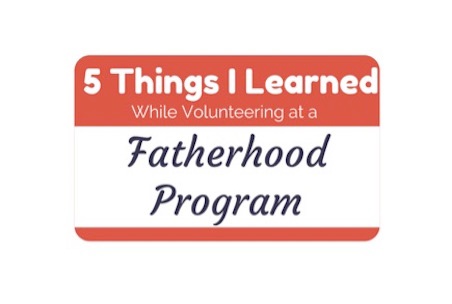5 Things I Learned While Volunteering at a Fatherhood Program
4 min read
Date Published: 09/15/2016
Last Updated: 10/15/2021
National Fatherhood Initiative Blog / Latest Articles
4 min read
I recently spent 12 weeks as a volunteer for my local 24/7 Dad® Program. After watching nine dads graduate the program, here's what I learned.

At NFI, we talk a lot about the irreplaceable role fathers play in their children's lives. We know the problem is larger than any one family—that the problem of father absence is generational. We also know, "It's difficult to be what you don't see." We see that when children learn inappropriate fathering, they often reproduce their experience with their own children.
This led me to volunteer for my local 24/7 Dad® program. I spent 12 weeks being a fly on the wall. Here's five things I was reminded of during this great opportunity.
I started writing about my experience shortly after visiting the fatherhood program. My first post was Confessions of a Volunteer Co-Facilitator: The Importance of Fathers. I was reminded of how important fathers are in their children's lives. We say this so often, and it's true, but we don't often understand the great responsibility that comes with it. I was reminded that learning fatherhood skills is for every dad—not just absent fathers. Everything we do as dads, impacts our children, for good or ill. Our children are watching—whether we like it or not.
After almost five years of working at NFI, most folks I talk with don't see fatherhood as a skill to be learned. In volunteering for this class, I was reminded of how fatherhood is a learned set of behaviors. If we're to be good at fathering, it takes time to study and learn. The great dads understand this and live by it.
Imagine never having a father or mentor in your life. Think about this: Where did you learn to be a good father? Did you learn from your father? Did you learn from another family member? What about from a friend? From school? Church? Whether your father was absent or not, you learned what to do and what not to do on some level. No matter our current level of skill, we can learn to be better. Which leads me to my next point...
We are modeled certain things, good or bad, by our own fathers. We also pick up behaviors from those around us like our family, friends, neighbors, teachers, churches. If I've learned anything from my time at NFI and especially while volunteering for this class, I learned that any father can learn to be a better dad. You don't have to be a perfect dad. You just have to be available, teachable, and take the initiative to be a better dad. Initiative, what a great word! Someone should put that word in the name of their organization.
As I think about the 12 weeks of sessions, the dads I watched in class inspired me. Regardless of the challenge that brought them to the program, they were there. Twelve weeks isn't easy. Life gets busy. Twelve weeks of anything signals a priority. Whether you come to one of our programs with a criminal record, divorce, jobless, ready to give up...being present is the first step.
No, nothing magically gets fixed with your spouse, ex-spouse, or kids just because you show up for a fatherhood class. But, to show up is to start on a different path. Just thinking about small groups of fatherhood programs meeting on a weekly basis gets me pumped. I get excited thinking about how much difference one dad can make when he has the skills he needs to address family history, communicate with his spouse or ex-spouse, and discipline his child.
A fatherhood program is only as good as its facilitator. The facilitator must use great curriculum and be trained (we have you covered for training here), and have experience running the program. This is why I wrote about the Four Roles of a Great Fatherhood Program Facilitator recently.
From being a nurturer, a scientist, a guide, and a teacher, our facilitators are special individuals. A facilitator invest his life into the fathers and families he serves. Think about your city. There are fathers who are struggling in any number of ways. You can help them. You can be the father and mentor that perhaps they never had.
I wrote about how my local county celebrated fathers by proclaiming June as Fatherhood Awareness Month. Can you get started on your own? Sure. But no fatherhood program with staying power is an island. My county doesn't just have one person behind all of the great work they're doing. It takes a team of people who have buy in to the mission of connecting fathers to their families. You need a network of folks who understand the importance of fatherhood in the community.
To give you an idea, here are a few examples of the types of positions you may want in your contacts to help make your fatherhood program happen. The following examples are some of the folks behind this county program:
Maybe your list of contacts will look different than this, but know you will need folks in your corner who understand how important fathers are in order to be successful over the long term.
I learned a lot from attending my local 24/7 Dad® program. I hope these five things will inspire you. If you already lead a program, keep up the good work. Get trained if you see an area your weak in. Reach out for help if you need it. If you don't volunteer in your community, consider volunteering for a program by visiting our Fatherhood Program Locator™.
Date Published: 09/15/2016
Last Updated: 10/15/2021
Download the ebook to learn how to create fatherhood initiatives that engage every sector of community life.

Train Your Staff
Fatherhood Programs
Fatherhood Data
© 2025 National Fatherhood Initiative®. All rights reserved.